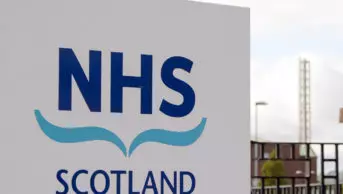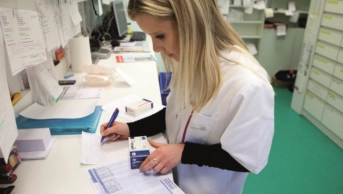
Alisdair Macdonald / Shutterstock.com
In 2018, a new General Medical Service contract was introduced in Scotland as part of primary care improvement. Driven by GP workforce issues, this extended the multidisciplinary team (MDT) to better manage their workloads, and one priority was a pharmacotherapy service delivered by pharmacists and pharmacy technicians.
Pharmacotherapy is intended to encompass a range of elements, including medication review, medicines reconciliation, prescription management and improvement. Although the initial focus was on prescription management (level 1 within the contract), a memorandum of understanding, issued in July 2021, clarified the need for a balanced focus to support patients at higher risk from medicines-related harm, including those on high-risk medicines (level 2 and 3 within the contract).
Building on existing primary care pharmacy teams, the three-year investment to April 2022 has increased the existing national workforce to 734 full-time equivalent (FTE) pharmacists, 380 FTE pharmacy technicians (plus 96 FTE cross sector preregistration) and 143 FTE pharmacy support staff.
To grow this workforce, we have introduced training places and early years posts for the first time, including national investment in 150 pharmacy technician apprenticeships. We have also introduced pharmacy support workers, a role that continues to evolve and increase the effectiveness of our teams. The skill mix has changed dramatically from predominantly pharmacists to moving towards a 50:50 split of pharmacists and pharmacy technicians/support workers. This allows us to use each professions’ skills optimally within service delivery models.
Despite challenges with available workforce, finance and the COVID-19 pandemic, the service has continued to iteratively build delivery as we identify more effective ways of working. Examples include:
- Delivering prescription management, reconciliation and advice from pharmacy technician lead remote hubs that support several practices across a geography;
- Working to test the role of community pharmacy in supporting medicines reconciliation (and supply) for patients at discharge from hospital.
Developing the workforce to undertake these new roles has been a huge focus. NHS Education for Scotland currently support a ‘General practice clinical pharmacist’ learning pathway and a foundation framework for pharmacy technicians. In total, 78% of our pharmacists are prescribers or in training. The publication of the Royal Pharmaceutical Society core, advanced and consultant curricula in June 2022 was an important step towards developing career frameworks in our service to underpin evolving models of care.
In a recent telephone survey of 65 patients in my health board, 100% were satisfied with the service
In terms of patient feedback, in a recent telephone survey of 65 patients in my health board 100% were satisfied with the service. Patients’ reported they really valued the conversation they have with us around medicines. However, 10% of respondents were not aware of the pharmacy team in the general practice, showing that further work is required to raise our profile.
Examples of some patient survey responses:
“I found the pharmacist to be very accessible when I called the practice to ask about my medicines, I was immediately referred to a telephone consultation and then given a face-to-face appointment. I was able to discuss all my medicines and found out what some of them were for, I had one increased, which has helped my angina symptoms. I found it very helpful.”
“Pharmacy technician was excellent. Kept me up to date throughout the process and sourced what we were looking for from another pharmacy due to a medicine supply issue; even contacting the consultant and going out of her way to make sure daughter did not run out of medicine and organised next dose/ prescription too.”
On sampling 117 practice staff, satisfaction levels were 77%, with suggestions for improvement largely based on national enablers, such as increased funding and staffing to meet workload demand.
Examples of some practice staff’s survey responses:
“Fantastic addition to our team and has become an essential service for both practice and patients. In particular pharmacotherapy has been very helpful during the pandemic.”
“The service and support from the pharmacy team has been invaluable. The team are very helpful. It has made a huge impact on GP prescribing workload.”
Moving forward, we continue to balance prescription management with supporting high-risk patients and managing high-risk medicines. Those living with frailty and chronic pain are key cohorts where pharmacy can improve care through holistic review. Research published by Osanlou et al. in July 2022 illustrates that 16.5% of hospital admissions result from adverse drug reactions associated with higher medicines use and number of comorbidities, which reinforces the need to ensure adequate review.
Our realistic medicine agenda encourages a person-centred approach to initiation and review of treatment, underpinned by polypharmacy guidance and patient resources.
One challenge is the variation in processes and workload that exists in general practice. The Scottish Practice Pharmacy and Prescribing Advisors Association (SP3AA) has created a ‘Once for Scotland’ service outline and underpinning process guidance around medicines reconciliation and acute prescription review. There are 77 practices from 11 health boards working with Healthcare Improvement Scotland to produce a toolkit for improving systems for managing acute prescriptions. This may include a person-centred review of high-volume items, such as analgesics and antidepressants.
Work continues with our community pharmacy colleagues to scale up the use of serial prescriptions, which can be given for up to a year within the ‘Medicines Care and Review’ service. The Pharmacy First scheme — which celebrated its second birthday in July 2022 — offers patients with common minor ailments a crucial alternative to GP practices. Work to increase community pharmacy prescribers will extend the scope of conditions that can be managed in that setting.
Prior to the introduction of the new GMS contract, primary care pharmacy had a dedicated focus on prescribing improvement programmes linked to optimising spend on medicines. In the current financial context, it is critical we do not lose sight of this and continue to support it in the context of value-based care.
Given the scaling in staff and service in such a short space of time, I think we should all be very proud of what we have achieved, and look forward to continuing to evolve pharmacy’s contribution to primary care.
Anne Thomson, lead pharmacist, clinical services, NHS Greater Glasgow and Clyde


